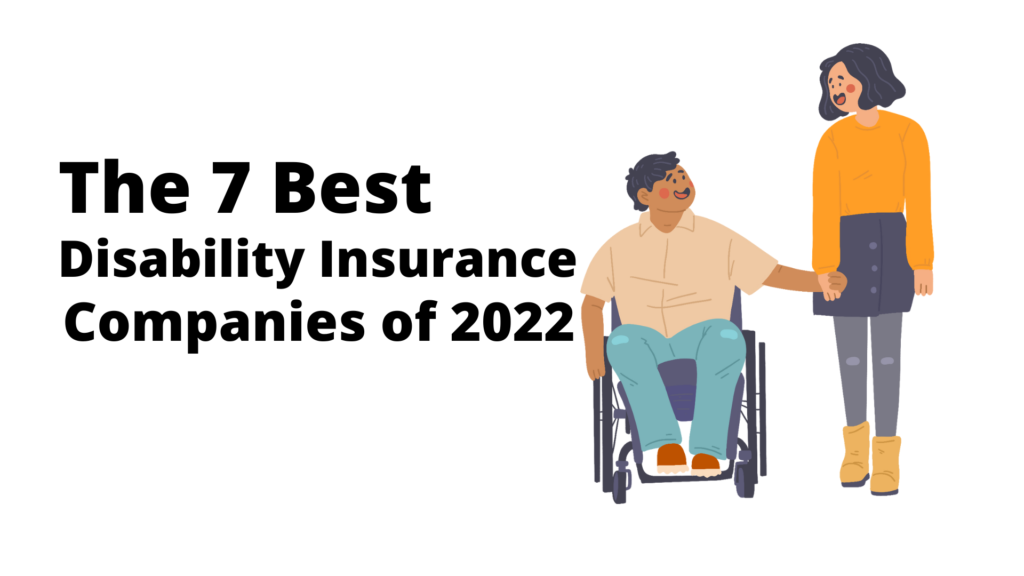(Short-Term & Long-Term Disability Insurance )
Data from LIMRA’s 2021 Insurance Barometer is seen that almost 3 in 5 American households have some form of life insurance.
In other words, you have a good chance — at least— a term life insurance policy and so have some experience optioning a life insurance policy that fits your financial requirements and life goals.
There is minimum possible you have experience looking for other type of insurance you maybe need. That would be disability insurance, a vital income substitution solution for workers not able to work productively due to serious injury or illness.

Best Disability Insurance Companies
Getting a disability insurance policy isn’t all that apart from getting a life insurance policy. And most of the best life insurance companies also write disability insurance policies, so you can see a lot of familiar names along the way.
Always shop for insurance using an aggregator like Policy genius. But the under-mentioned disability insurance providers, in specific, are among the best for U.S.-based workers. Each get individualize in a different way, and our best overall choose provides the greatest value for the widest number of users.
Breeze Financial & Insurance Services Group
Breeze is the best disability insurance provider overall because it’s affordable, pliable, and free from the red tape that the insurance industry is well known for.
Specific selling points include:
- Facilities of short- and long-term disability solutions that are all about benefit and affordability
- A 100% online application process cuts traditional sales-people out of the equalization
- Excellent-affordable premiums starting at $9 per month for young, well workers seeking long-term coverage — importantly less than many mainline insurers charge
- A transparent under-writing process that go away applicants through the whole scope of coverage
- Policies that can provide shelter a range of non-traditional situations, inclusive solopreneurs and small-business owners with difficult insurance needs.
And Breeze provides low-risk applicants an immediate approval option that waives the common medical under-writing need. That means no attack medical exams or time-consuming labs required.
Best for Part-Time Workers: Northwestern Mutual
Northwestern Mutual specializes in long-term disability plans with changeable-length Annulment periods that viaduct the coverage gap between what employer-sponsored disability plans pay and policyholders’ pre-disability income.
These plans get in an un-usually wide diversity of configurations. These include non-traditional products and add-ons for part-time workers, who are always excluded from the condition insurance market. Northwestern Mutual also provides disability insurance coverage for stay-at-home parents whose spiritual labor is serially undervalued.
Additional features:
- A++ (Superior) financial strength rating from AM Best — the highest possible score
- A+ customer contentment rating from the Better Business Bureau
- Find coverage through a financial advisor
- Affordable premiums below the national average
Best for Salary and Retirement Income Protection: MassMutual
MassMutual’s customizable disability insurance products come with alternative riders you won’t find everywhere else.
One highlight: a retirement savings protection rider that earmarks some income for your retirement plan, keeping your long-term penetration strategy on track when you’re temporarily not able to work.
Another MassMutual rider pegs advantage’s growth to salary growth, adding protection as your career advances and the possibility of a long disability grows more costly. That provides critical protection for earned income as well.
Additional features:
- Accommodate your policy to protect between 45% and 65% of your pre-disability income
- Purchase your policy through a well-informed agent
- A++ (Superior) financial strength rating from AM Best
- Competitive premiums
Guardian: Life Insurance Company of America
Guardian Life Insurance Company of America provides short- and long-term disability insurance for self-employed personals, group plans for employers, and complementary policies for workers looking to add to their employer-sponsored coverage.
Because its policies are only accessible through licensed insurance brokers or employers themselves, Guardian needs all would-be policyholders to go through a broker and definitely caters to small-business owners and executives seeing to stop employees with attractive disability coverage.
But it’s a solid option for self-employed workers with changeable income, a group that tends to be perceived as high-risk by most disability insurance providers.
Additional features:
- A++ (Superior) financial power rating from AM Best
- A+ customer contentment rating from BBB
- Use affordable complementary disability insurance policies to add coverage to an employer-sponsored plan
- Find affordable personal coverage through an agent
Best for Portable Coverage: Principal Financial Group
Like Guardian Life’s, Principal Financial Group’s disability insurance providing is gated also. In this case, it’s available only for clients of Principal Financial Group advisors and those want to set up an advisory relationship (even if temporary) to get disability coverage.
On the bright side, Principal has a clef selling point: All of its policies are written for personals, not employers, and are hence portable, meaning they stay in force when you change jobs.
And because Principal clients’ relationships enlarge well beyond disability insurance, they can sometimes qualify for lower premiums than those accessible through one-off particular policy transactions. Of course, the most delicate factor in any pricing conclusion is the perceived risk of disability.
Additional features:
- A+ customer contentment rating from the BBB
- Use Principal Financials handy disability insurance calculator for finding out how much coverage you need
Coverage After Age 65: Mutual of Omaha Insurance Company
Mutual of Omaha Insurance Company provides the potential — though not the guarantee of coverage up to age 75, while you continue to work full-time and pay premiums.
Mutual of Omaha does put to one side the right to cancel your policy after age 67. But its golden-years coverage is still uncommon— and welcome.
Additional features:
- Top coverage limits — up to $12,000 per month for well-reimbursed employees
- Buy through a licensed agent
- A+ (Superior) financial strength rating from AM Best
- A+ customer contentment rating from the BBB
Best for “Any Occupation” Coverage: Assurity
Assurity is a flexible chooses for workers with longer-term disability income insurance requirements.
It really stands for its commitment to “any occupation” coverage. What this means is that even if you’re capable to perform some duties in a role or occupation other than the one you held before your disability, you can left from of the workforce (and earning benefits) until you’re once more capable for doing the job you were trained for.
That’s a much more liberal standard than “own occupation,” which many insurers like better for understandable reasons.
Additional features:
- Long-term disability coverage periods start at one year and continuing up till retirement age
- Customizable advantage’s amounts for partial disability great for those transitioning back to the workforce
- Total disability coverage if you’re not able to work at all
- A+ customer gratification rating from the BBB
How We Choose the Best Disability Insurance Companies
We use multiple way factors to assess insurance companies and choose the best disability insurance providers around. Each connects in some way to the overall cost, importance, benefits, or flexibility of coverage — all important opinion for people seeking reliable income replacement.
Policy Types Available For Disability Insurance
The term “disability insurance” is usually used as shorthand for long-term disability insurance, which is really important for people who aren’t capable to work for years at a time. But short-term disability insurance is major as well for people recovering from short-term illnesses or injuries — or managing life incident like the birth of a child.
Policy Premiums for Disability Insurance
It’s not rocket science: insurance premiums are better when they’re less. During every insurer is apart and straight premium comparisons aren’t often apples-to-apples, we normally prefer disability insurers that charge less for similar coverage.
Coverage Types and Limits
This reason covers two the most important questions about disability insurance:
How much coverage can you receive, measured as a percentage of your pre-disability pay?
When can you file a disability insurance claim?
The most important opinion here is whether your policy covers “own profession” disability or “any profession” disability. The former is more liberal because you can file a claim when you’re not able to work in your own profession. With “any occupation” disability, you only file a claim if you’re not able to work in any productive ability, which typically needs a more profound disability.
Waiting Periods
This relates to another important question: how must long you wait before your advantages come? Long-term disability policies can have waiting policies while one to two years, which is a long time to go without income if you’re unable to put back it through other means. This is why an employer-sponsored temporary disability policy is the biggest thought to a privately sourced long-term policy.
How Long Policies Remain Effective
For long-term disability, “implausibly” — that’s meaning until an agreed-upon age at which you would have retired — is the best option, though you will have to pay higher premiums. Temporary policies usually last no more than six months.
Financial Strength Ratings
How much possible is your insurer to pay out on your claim? If you have to consider about this for very long, you might want to think about another provider. The best way to estimate the likelihood of paid — or unpaid — claims is to use financial strength ratings from objective third-party agencies.
Choose the Best Disability Insurance Company
While assessing disability insurance companies and policies, pay closer attention to policy and firm specifics like:
- The length of the effacement period (the waiting period before benefits come in) for short-term policies and long-term policies (as they’re always different)
- The length of the advantage period itself (which is often longer for long-term policies)
- The monthly profit amount
- Actual disability insurance costs (monthly premiums)
- Whether the policy provide “any profession” or “own occupation” coverage (or both)
- Whether the policy provides yearly cost of living correspondence to keep pace with inflation (and if so, how much)
- Whether the company provides personals disability insurance policies, group disability policies, or both
- The disability claim filing procedure, which can vary importantly by insurer
- The best disability company for your requirements checks as many of these boxes as possible.
Keep in mind that the best provider for you might not be the best for your neighbor. Don’t give too much importance to anecdotal feedback that may or may not apply in your circumstances.



